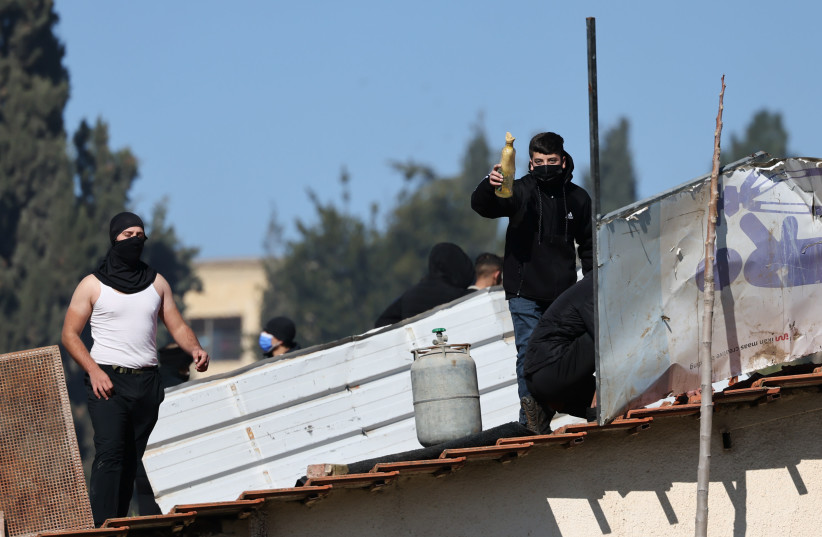Police evicted a large Palestinian family from their two homes before dawn on Wednesday, less than two days after they had threatened self-immolation over the pending loss of their east Jerusalem houses in the Sheikh Jarrah neighborhood.
The demolition of the two homes owned by the Salhia family ignited tensions between Israel and the Palestinians, with calls for escalating resistance against the Jewish state.
The international community, including the European Union, had demanded that Israel allow the family to remain in their two adjoining homes.
In New York, United Nations Security Council members condemned the eviction and subsequent demolition of the two homes.
Ireland’s Ambassador to the UN Geraldine Byrne Nason said that such actions were contrary to the Fourth Geneva Conventions.

They also “threaten the fragile status quo in Jerusalem and risk increasing violence” in that city, she warned.
UN Special Coordinator for the Middle East Peace Process Tor Wennesland urged an “end the displacement and eviction of Palestinians.”
Some 20 people, including members of the Salhia family were arrested during the evacuation on suspicion of violating a court order, violent fortification and disturbing public order. As of Wednesday night, five family members, including the owners of one of the homes, Mahmoud, were still in police custody.
The original stand-off with police on Monday had ended with the demolition of the family's plant nursery and two storage structures on the property.
Fearful that their home was the true target of the raid, members of Mahmoud Salhia’s family had gone on the roof with gas canisters and threatened to set themselves on fire should the police approach.
The family descended from the roof only once the police had left. Officers returned around 3 a.m. Wednesday and removed the family from the home while it was still dark and demolished the stone structure.
Police also demolished a second property on the site that belonged to the Mahmouds’ sister Alma. The two siblings had been in the midst of a protracted legal battle with the city to save their two homes located on the property. According to their attorney Walid Thaer, that battle dates back to the 1990s.
The city had designated that property lot for public use already back in 1984 but officially expropriated it in 2017 for the construction of a school to serve Arab children with special needs.
The Salhia family has claimed that they purchased the property after they fled from the western Jerusalem neighborhood of Ein Kerem during the 1948 War of Independence but had not yet registered it with the Jordanian authorities prior to the Six Day War in 1967.
Such registration was not possible once Israel annexed the city from Jordan after the war.
The Salhia family is not the only claimant to the 32 dunam property lot, which has other Palestinian claimants, all of which have sought redress for the loss.
Court documents place the Salhia family at the site, already in 1998, long before there were any plans for an Arab school at the site.
The Jerusalem District Court had ruled in December that Mahmoud's family could be evicted, but it had appealed the ruling in January. Alma's case is still under adjudication and there is now a legal initiative to join both cases.
Thaer charged that the police and the municipality overstepped their authority on Wednesday, because the court had empowered them only to evict Mahmoud and his wife, but did not allow for them to demolish the two homes.
The state had been expected to submit an opinion regarding the appeal on Wednesday, in advance of a hearing is set for January 23rd, according to the leftwing NGO Ir Amim.
According to the left-wing NGO Ir Amim, the state had now asked that the appeal be dismissed.
In an unusual move the police and the municipality issued a statement about the eviction.
"The evacuation of the area has been approved by all the courts, including the Jerusalem District Court," it said noting that there had been an evacuation order against the home already back in 2017.
"Members of the family living in the illegal buildings were given countless opportunities to hand over the land with consent, but unfortunately they refused to do so, even after meetings and repeated dialog attempts by the Jerusalem municipality," it stated.
"The family's illegal takeover of public space prevented hundreds of children with special needs from East Jerusalem from receiving an educational service that the municipality seeks to provide," it added.
For the Salhia family and their supporters, the eviction is part of a larger narrative, in which hundreds of Palestinian families face eviction to make way for public projects or Jewish housing.
The municipality has downplayed the significance of these evictions, as individual property disputes. The Palestinians, the international community and the Israeli left have argued that the evictions are part of a deliberate policy to force Palestinians to leave the city.
Two left-wing groups involved with the Salhi family, Ir Amim and Peace Now have argued that the municipality did not need to evict the families to build the school, noting that there was enough room on the property for both the homes and the educational institution.
To underscore that point it noted that a portion of the property had been designated for the construction of a Jewish religious seminary.
Ir Amim said the family had not been offered compensation and that the municipalities' comments about countless overtures made by the family were incorrect.
Religious Zionist MK Itamar Ben-Gvir spoke out in support of the eviction.
"The state must first demonstrate governance in Jerusalem and not allow lawbreakers to threaten the state of Israel," he said.
MK Ofer Cassif (Joint List) condemned eviction, which he said took place “In the middle of the freezing night and with severe violence.”
“Ethnic cleansing must be stopped immediately, the evacuees returned to their lands, or, alternatively, compensated properly.”
